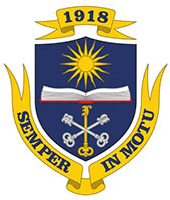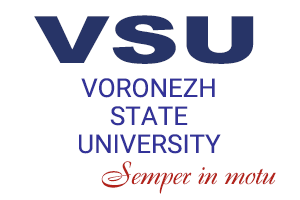Julio Cesar Sanchez is from Colombia. Caesar (as he is called by his Russian friends) is 29 years old, 9 of which he has spent living in Russia. He has long considered this country to be his home: Caesar received his degree here, which allowed him to work in his favourite profession. Now, he is a PhD student at Saint Petersburg State University, a researcher, and a geophysicist. However, his professional development took place in Voronezh. Julio Cesar Sanchez started to learn about his profession and Russian culture at the Faculty of Geology of VSU.
Angelina Tatarintseva: “Why did you move to Russia?”
“I found myself in Russia because I was eager to develop and receive a high-quality higher education. Since my childhood, I have been fond of geology and everything related to the history of Earth. My family did not have money for my education in Colombia and in Russia I could get a state-funded place. After graduating school, I had the opportunity to get a scholarship to go abroad to study. I spent two years collecting the necessary documents: the hardest part was to get a visa. I got help from people I met on my way and they contributed a lot to the achievement of my goal.”
A.T.: “Why did you choose VSU out of all universities?”
“When I enrolled on the bachelor's degree programme in 2013, I did not choose the university, the state chose it for me. I just submitted the documents, and the admission process was performed by the university. I am glad that I had the opportunity to complete a bachelor's and a master's programmes at the Faculty of Geology of VSU. Here, I learned how to build relationships with people and to achieve my goals. Apart from the skills that I learned, I would also like to note the high level of knowledge that you receive at VSU. I want to say a big thank you to my teachers who helped me in the learning process: Viktor Glaznev, the Head of the Department of Geophysics, all the staff of the department, my supervisor Valery Zhavoronkin, and my groupmates. They always supported me and helped me to cope with the difficulties that I faced when studying.”
Ivan Kolupaev: “You mentioned the difficulties that you faced when studying. What were they?”
“At first, it was difficult for me to study because my level of Russian was very low. I had to repeat the studied material and read textbooks many times. Then, my groupmates and teachers helped me to overcome the language barrier. Teachers paid a lot of attention to international students and always helped them: if we didn't understand something, they found extra time to explain the topic to us again. After completing the first year of the bachelor's degree programme, I was able to freely communicate, study, and understand people around me.”
I.K.: “Did you meet any students from your country while studying at the university?”
“Yes, there were students from Colombia and other countries of South America.”
I.K.: “Was it easier for you to study together with them?”
“I hardly ever saw them. I spent all my free time learning Russian and studying.”
I.K.: “You are now working as a geophysicist. You explore the physical structure of Earth and go on business trips a lot. Are you interested in applying your knowledge to study the territories of Russia?”
“Geophysics plays a big role in studying not only the geology of Earth, but also the physical properties of rocks and this is what I like most in geology. I completed a bachelor's and master's programmes here in Russia, so I want to apply the knowledge and gain new experience here, in the Russian Federation. For example, this summer I worked in Kamchatka as an assistant geophysicist: I explored the territory by the transient method (it is based on studying an unsteady electromagnetic field that occurs in rocks when switching off the electric current in the supply circuit). I got to Kamchatka thanks to my teacher, Galina Zolotareva, Associate Professor at the Department of General Geology and Geodynamics. She helped me to get in touch with the chief geophysicist, and as a result I was able to get the job. I wanted to explore the territory of Kamchatka in 2019, when I was doing my master's degree programme at the Faculty of Geology at VSU. However, at that time I didn't have a work permit.”
A.T.: “Why couldn't you get the permit?”
“Then, I did not have the documents that allowed me to work as a citizen of the Russian Federation. In 2019, I only had a student visa. By law*, when I completed my master’s degree with honours, I received a residence permit and was able to start work.”
*A residence permit can be issued to: foreign citizens who successfully completed a full-time higher degree programme in the Russian Federation and received an academic diploma with honours (Federal Law “On the Legal Status of Foreign Citizens in the Russian Federation”, Chapter 1, Art. 8, para 1).
I.K.: “Have you ever worked in your specialisation anywhere outside Kamchatka?”
“In 2015 and 2017, I was doing an internship at a Canadian gold mining company. In 2019, I completed an internship in Buryatia, in a gold mining company.”
I.K.: “Which was more interesting?”
“I can't say which was more interesting because in each company I learned something new. And I can apply this experience in my work.”
A.T.: “What would you advise to international students who want to start working in Russia?”
“I would recommend to anyone who is studying here and wants to stay here to solve issues related to obtaining documents which allow working in the Russian Federation: patents, temporary residence permits, residence cards. For many employer companies employing foreigners without documents allowing them to work in Russia means large financial costs to pay the taxes.”
A.T.: “How did your family take your decision to move to Russia?”
“My family and friends always support me in any decision. They were very happy when they found out that I had entered a university in Russia.”
A.T.: “How often do you see them?”
“It’s been five years since I visited my homeland: now tickets to Colombia are very expensive, starting from 200 thousand roubles. But when I came here, I knew it would be hard to return home. I miss my family, and when the opportunity arises, I will fly to visit them.”
A.T.: “What was the hardest thing for you to get used to at the beginning of your life in Russia?”
“It is always difficult for any foreigner in Russia to get used to Russian culture and people at first: many people walk with serious faces and hardly ever smile. Compared to Colombians, Russians are more reserved, sometimes closed and cold. But when you spend more time with Russian people and dive into the culture and traditions, these people turn out to be cheerful and very friendly. My ability to find a common language with others helped me a lot. In Colombia, we are all very open, cheerful, we love dancing and having fun anywhere and at any time!”
I.K.: “What’s your attitude to Russian culture?”
“I liked the Russian culture immediately. As for literature, I especially like Bulgakov's “Masters and Margarita”. As for films, I like “Ivan Vasilevich changes profession” (this film was recommended to me by a friend).”
A.T.: “Having lived in Russia for several years, can you call it your home?”
“I was 19 years old when I came to Russia. I’ve spent nearly 10 years here, I’ve grown older, met a lot of wonderful people, and become a professional in my field. My life can be divided into life “before” and “after” my studies in Russia.”
I.K.: “How do you see your further career?”
“I love my job and I always try to learn something new. I am currently completing my PhD degree at Saint Petersburg University. I continued my studies there after receiving a master's degree in Voronezh, since the Faculty of Geology at VSU had no dissertation committee in my field. I am currently working on my dissertation dedicated to the topic “Structure and evolution of the Carlsberg Ridge according to geophysical data”. This work is aimed at studying the peculiarities of the spatio-temporal structure of the anomalous magnetic field and their sources when solving fundamental problems in the waters of the World Ocean. I am also developing in terms of practical skills. I want to become a chief geophysicist in the nearest future.”
I.K.: “Are you planning to continue to do research?”
“Yes, in the future I want to move to Canada and continue my research there: my profession is very much in demand there.”
Text: by Angelina Tatarintseva; Ivan Kolupaev, graduate student from the Faculty of Geology of VSU
Photo: from the personal archive of the interviewee










